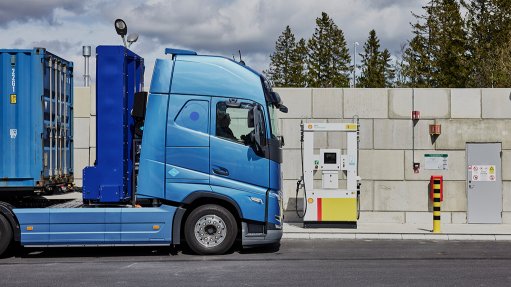
Volvo Trucks has started testing commercial vehicles powered by hydrogen technology.
The Swedish manufacturer already offers battery electric trucks and trucks that run on renewable fuels, such as biogas. The goal is now for hydrogen trucks to be added to its product portfolio in the second half of this decade.
“We have been developing this technology for some years now and it feels great to see the first trucks successfully running on the test track,” says Volvo Trucks president Roger Alm.
“The combination of battery electric and fuel-cell electric will enable our customers to completely eliminate carbon dioxide exhaust emissions from their trucks, no matter the transport assignment.”
Volvo Trucks says its fuel-cell trucks will have an operational range comparable to many diesel trucks – up to 1 000 km – and a refuelling time of less than 15 minutes.
The total weight can be around 65 t or higher, and the two fuel cells have the capacity to generate 300 kW of electricity onboard.
Customer pilot studies will start “in a few years from now” and commercialisation is planned for the latter part of this decade.
“Hydrogen-powered fuel-cell electric trucks will be especially suitable for long distances and heavy, energy-demanding assignments,” notes Alm.
“They could also be an option in countries where battery charging possibilities are limited.”
A fuel cell generates its own electricity from the hydrogen onboard, instead of being charged from an external source. The only byproduct emitted is water vapour.
Volvo Trucks’ fuel cells will be supplied by Cellcentric – a joint venture between the Volvo Group and Daimler Truck.
Cellcentric will build one of Europe’s largest series production facilities for fuel-cells, specially developed for heavy-duty vehicles.
Fuel-cell technology is still in an early phase of development and while there are many benefits, there are also some challenges.
One of them is large-scale supply of green hydrogen – hydrogen produced by using renewable energy sources, such as wind, water and sun.
Another is the fact that refuelling infrastructure for heavy vehicles is yet to be developed.
“We expect the supply of green hydrogen to increase significantly during the next couple of years, since many industries will depend on it to reduce [emissions],” says Alm.
“However, we cannot wait to decarbonise transport, we are already running late.
“So, my clear message to all transport companies is to start the journey today with battery electric, biogas and the other options available. The fuel-cell truck will then be an important complement for longer and heavier transports a few years from now.”